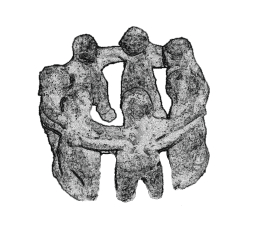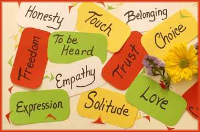Phases of the Moon, the newsletter of the Maine NVC Network
Volume Nine, Issue Five:
A Long Journey to Restorative Circles
Our newsletter appears approximately once a month. Our purpose is to contribute to the NVC learning of people who have taken at least an NVC Level 1 workshop, and help us stay connected as we endeavor to deepen a culture of peace within ourselves, our families and the world. We believe a Level 1 offers so many new ways of thinking that additional support for learning and integration could be helpful.
We endeavor to make each edition informative, connecting, inspiring and fun. Please let us know how the newsletter might contribute to your NVC well-being. Email: newsletter at mainenvcnetwork.org
Contents
- A Long Journey to Restorative Circles
- Practice Suggestions
- Upcoming Trainings
- Special Announcements
- Monthly Empathy Circles and other Ongoing groups
- Paid Announcements
A Long Journey to Restorative Circles
by Leah Boyd
Early in June I had the opportunity to travel to Wardenburg, Germany, to attend a four-day training focused on an NVC-connected process called Restorative Circles (RC). The trainer was Duke Duchscherer, a certified NVC trainer with vast experience using the RC process in intense conflict situations around the globe. The authenticity he brought to the work was deeply satisfying for me.
I had been hearing about RC for years and finally the causes and conditions came together to allow me to attend a training!
I experienced the assembled group of 30 participants – from Germany, Poland, Rwanda, South Africa, Netherlands, Switzerland and the US – as sincere, self-responsible, caring, & dedicated. For four days we sat together in a beautiful circle of learning and shared reality. Helping groups navigate conflict is a strong passion of mine. I believe that we are wired for cooperation and contribution and that the answers to our current challenges lie in being able to think creatively together. I’m excited to pass on some of the highlights of what I learned about Restorative Circles.
The RC process was originally designed in the mid-1990’s by CNVC trainer Dominic Barter to support reconciliation in Brazil, where he was living and working. The RC process brings together those who have acted in a way that has caused harm, those who have been directly impacted, and the wider community. RC has been used in contexts ranging from family matters to United Nations efforts.
We began the training by delving into the question, "What is community?" and landed on the answer that community is a structure of belonging. The RC process is focused on the relational aspect of community and the recognition that when this aspect breaks down, some type of restorative practice is important. RC creates space for truth telling, healing, reconciliation & repair.
The RC process is designed to facilitate dialogue, or "flow of meaning", between community members. Listening for meaning is basically listening for feelings & needs, as we are so accustomed to doing in NVC. However, the RC process is designed to be effective with communities whether they have NVC experience or not, hence the use of more common language.
The process begins when someone in the community initiates it. The facilitator meets with those who have acted in a way that has created harm, those who have been directly impacted, and other community members who have been touched in some way. These meetings are separate sessions called "Pre-Circles" where the facilitator hears about the situation, provides empathy, explains how the RC process works and finds out if people are willing to participate.
In the next step the whole group gathers in a circle for dialogue that is organized in a specific way. The circle unfolds in three rounds and in each round participants are invited to speak to a particular question:
- How are you right now with regard to what has occurred?
- What was the meaning behind whatever you did regarding this occurrence? (In NVC-speak, the needs you were serving in whatever action, or inaction you chose)
- What actions are you willing to take going forward?
Participants are guided to speak and listen in a particular way as well. Each time someone wishes to speak, they are invited to choose someone in the circle who will reflect back the meaning they heard. The speaker will be able to correct or add to the person’s reflection until they are satisfied they have been heard completely and accurately.
To the greatest degree possible, the facilitator is careful not to insert themselves into the dialogue. Rather, the facilitator helps the community members develop their own dialogue skills by using just three guiding questions:
- (To the speaker) Who would you like to hear you?
- (To the listener) What did you hear him/her say?
- (To the speaker) Is that what you wanted heard?
Crucial to the effectiveness of a restorative circle process is the strength of the container created by the facilitators. Some of the steps in creating the strong container include:
- Meeting with the "sources of power", both official and unofficial
- Helping the community create their own restorative system by considering how they handle conflict presently, what’s working & what isn’t, and how they would ideally like to handle conflict. In this way the RC process rests within a larger system the community has in place for managing conflict.
- Creating guidelines for the circle process that make sense in the particular context/community/culture you are working with
- Choosing the meeting space with care. It’s good to have a space that in some way represents the importance of the process.
- Working toward creating conditions where anyone can initiate a circle, not just those with structural power.
When the circumstances are especially high in intensity, such as where there has been recent violence, or where there are power differences, outside pressures, etc., it is best to strengthen the container further by increasing the number of facilitators.
Upcoming Trainings
Trainings listed here are in the Maine region. If you wish to list an event, please follow our guidelines for submission. Please note that both certified and non-certified trainers, (who are willing to follow certain requirements of the Center for Nonviolent Communication), may be leading the posted trainings. Listing here does not imply endorsement by the Maine NVC Network of the trainer or the event.
Special Opportunity:
2018-19 MAINE NVC INTEGRATION PROGRAM
begins Sept. 7-9 in Saco, ME.
Online registration and payment HERE. (scroll to bottom of page)
Program details and mail-in registration form HERE. (printable pdf)
* * * * * * * * * * * * * * * * * * * * * * * *
September 17, Portland, ME
Building Connection in Divisive Times
FMI & registration
* * * * * * * * * * * * * * * * * * * * * * * *
Sept. 21-23, Unity
Stop by the Maine NVC Network booth
at MOFGA’s Common Ground Fair
* * * * * * * * * * * * * * * * * * * * * * * *
Oct. 26-28, South Portland
From Conflict to Connection
an NVC Level 1 workshop
with Peggy Smith
FMI & registration
* * * * * * * * * * * * * * * * * * * * * * * *
|
Ongoing
Special Announcements
|
Visit our Facebook page: Maine NVC Network is looking for someone who enjoys Facebook AND NVC to take on responsibility for keeping our FB presence alive and active through interesting postings, and other possibilities. If you are interested in contributing to the community in this way please contact
Do you want to receive emails about upcoming NVC trainings and other NVC events in and near Maine? Join the Maine NVC Network
|

